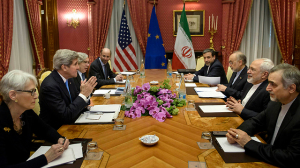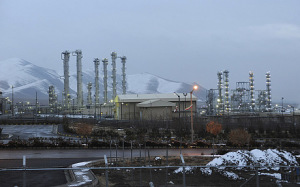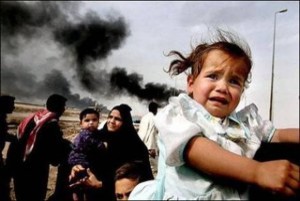Photo: People celebrating the agreement in Iran.
On July 14, an agreement on Iran’s nuclear program was signed in Geneva. The agreement is called the Joint Comprehensive Plan of Action. The signers of the JCPOA include Iran, the five permanent members of the UN Security Council—Britain, China, France, Russia and the United States—Germany and the European Union.
The JCPOA follows an initial agreement signed on Nov. 24, 2013, a year and a half earlier. The JCPOA conforms to the broad outline of the 2013 agreement, whereby Iran is allowed to continue doing nuclear work, but in much smaller quantities and under restrictions.
Specifics of the agreement
According to the JCPOA, the U.S. and others recognize Iran’s right to enrich uranium for peaceful purposes. This is a right guaranteed by the Nuclear Non-Proliferation Treaty, but one that the imperialists have effectively refused to recognize up until now.
Iran will implement the “Additional Protocol,” giving the International Atomic Energy Agency more powers to monitor its nuclear facilities. The additional protocol is a concession that Iran has been offering for over a decade, saying that it has nothing to hide.
Iran will reduce two-thirds of its uranium enrichment activity. Of its 19,500 centrifuges, only 6,000 will keep spinning. As for the 8 ton stockpile of low-enriched uranium, Iran will keep 300 kg and export the rest. The Fordow facility, built inside a hollowed-out mountain and virtually impenetrable by aerial bombardments, will remain operational, but only as a research center. The heavy water plant at Arak will continue operating, but will be redesigned to make it unable to produce weapons-grade plutonium, if that were the intent.
Once the IAEA confirms that these steps are taken, the U.S. and its allies will lift all nuclear-related economic sanctions, including oil embargos and financial restrictions. This will release $100-$120 billion of Iran’s frozen assets. But Iran will remain subject to a UN arms embargo for five years, with restrictions on its ballistic missile program remaining in effect for another eight years.

Why Iran wanted a deal
The latest round of U.S. and European Union sanctions that went into high gear in early 2011 had the intended consequence of devastating Iran’s economy. Almost overnight, Iran’s currency, the Rial, lost 2/3 of its value against foreign currencies. The currency’s drop resulted in runaway inflation and the destabilization of the economy. Predictably, the working class and the poor had to bear the brunt of the economic crisis, struggling to survive when the prices of necessities went up astronomically.
In addition to causing high inflation, sanctions caused serious disruptions in many areas of the economy. By essentially locking the government and private companies out of the world trade system, raw materials, machine parts and other supplies were made extremely difficult and expensive to acquire.
Sanctions have also affected people seeking medical care. Although Iran eventually managed to more or less stabilize the supply of drugs, the sanctions have caused several deaths due to lack of access to medicine.
If a deal had not been reached, not only would the sanctions have continued, they would likely have expanded. At the time the sanctions were passed, the U.S. agreed to allow countries buying Iran’s oil to continue doing so, as long as they showed an effort to reduce their oil trade with Iran. India, China and South Korea fell into this category. But with the current glut of oil in the international market, that grace period would soon have ended, making it impossible for Iran to sell oil in the open market. Already, Iran’s oil exports have been cut in half.
Countries need commodities, raw materials and tens of thousands of items both for public consumption and for keeping industries and agriculture running. No country in the world is anywhere near self-sufficient. To be cut off from international trade devastates an economy. One can only imagine what would happen to the U.S. economy if the country could hardly export or import anything. That is essentially what the sanctions did to Iran.
Comprehensive sanctions are a form of war. The undeclared goal of the sanctions was the overthrow of the Iranian state. When an economy collapses, the state is destabilized and any number of developments can lead to its overthrow. But this did not happen.
It is surprising how well Iran’s economy has withstood the sanctions. Store shelves have remained full of all kinds of products. There are no shortages of basic food items. Most medicines are cheap and abundant. Shopping centers and restaurants are bustling with business. Iran has just not looked like a country under comprehensive sanctions.
In 1991, after an intense bombing deliberately targeting Iraq’s civilian infrastructure, the U.S. and its imperialist allies imposed similar sanctions on Iraq, which continued right up to the 2003 invasion. Thousands of Iraqis were dying every day due to lack of access to food, medicine and sanitation.

Compared to Iraq, Iran has fared much better under sanctions. The main reason, of course, is that the U.S. imposed sanctions on Iraq after it had destroyed the country’s civilian infrastructure. In addition, Iran had the advantage of a much more diverse economy, enabling the government to skillfully manage the sanctions. For decades, Iran’s economy had been solely reliant on oil. Now, the sanctions have cut oil sales in half – 1.3 million barrels per day, compared to 2.5 million bpd before the sanctions, compared to 6 million bpd before the revolution. The fact that the economy still stands is testament to the development of a wide array of industries upon which the economy can rely.
To work around the sanctions, the government has applied many tactics, including by-passing the sanctions through opening virtual shipping companies, selling oil through Iraq, and so on. Since Iran can no longer deal through the international banking system, it has bartered much of the oil, in particular with China and India. In exchange for oil, Iran is getting other commodities – e.g. gold and wheat from India, electronics from China. And then there has been a network of government-appointed individuals who travel abroad and conduct trade in cash, a practice that inevitably opens the door for corruption.
Having acknowledged all the ways in which Iran has managed to soften the blow, it is important not to dismiss or minimize the importance of the sanctions. A modern economy cannot function indefinitely under sanctions. An economy that is limited to working around sanctions cannot grow, create jobs and develop the country. The sanctions are not about one country, the U.S., not trading with Iran. The sanctions subject all governments and companies around the world to severe fines if they trade with Iran. The sanctions are a form of economic strangulation.
The sanctions are a form of economic strangulation.
Given the debilitating effect of the sanctions, there is no doubt that Tehran has always wanted to find a way to end them. President Rouhani won the 2013 elections in a landslide on the explicit campaign promise of brokering an agreement with the U.S. In reality, the determining factor in making a deal possible was not Rouhani’s resolve or the negotiating skills of Foreign Minister Zarif. It was a shift in U.S. policy. But the fact that, after the initial shock, Iran managed the sanctions quite well should not lead anybody to think of sanctions as secondary or insignificant.
What’s behind opposition to the deal in Iran
The announcement of the JCPOA was met with people celebrating in the streets, dancing and handing out sweets. But there is opposition both among a minority of the people and in the political establishment. Those opposed to the agreement view any restrictions on the nuclear program as inherently unfair, and justifiably so.
The liberal narrative holds that the agreement is opposed by “hardliners” in both countries. But putting an equal sign between “hardliners” of both countries misses the point. Through the JCPOA, imperialist powers impose unjust restrictions on an oppressed country that they have sanctioned. U.S. “hardliners,” many of whom believe the U.S. should bomb Iran, and Iranian “hardliners,” who believe Iran should not consent to imperialist-imposed restrictions, cannot be considered ideological cousins!
U.S. “hardliners,” many of whom believe the U.S. should bomb Iran, and Iranian “hardliners,” who believe Iran should not consent to imperialist-imposed restrictions, cannot be considered ideological cousins!
After years of sanctions and the assassination of several nuclear scientists likely by the U.S. or Israel, some in Iran view reaching an agreement as a betrayal of the country’s independence. How can Iran be subjected to limits on its nuclear program on the pretext that it might one day develop nuclear weapons when the imposers of the restrictions are nuclear-armed states themselves? If threats made by officials against the state of Israel are the basis for Iran posing a grave danger, why is it okay that Israel and the U.S. have for years been making threats against Iran? Why can “all options” be on the table for the U.S. and Israel, which actually have nuclear warheads, when Iran is not allowed to state that it will retaliate if attacked?
Still, there is no question that the strong majority of Iranians are in favor of the agreement and recognize that, under the current balance of forces internationally, Iran is better off making concessions to end the sanctions than living under sanctions indefinitely.
Why the U.S. pursued a deal

Imperialists do not typically back down from demands they place on oppressed countries. The case of the former Yugoslavia is a case in point. Before the 1999 bombing of Yugoslavia, in what were called negotiations, U.S. representatives presented the Rambouillet Accord on a “take it or leave it” basis to the president of Yugoslavia, Slovodan Milosevic. Rambouillet would have required Yugoslavia to sign away its sovereignty and accept a NATO occupation of its soil. When Milosevic understandably refused, the Clinton administration claimed that Milosevic would not negotiate in good faith and the U.S. had no choice but to bomb Yugoslavia. This is typically how imperialists negotiate with oppressed countries.
So-called negotiations between the U.S. and Iran go back over a decade. But it has only been during President Obama’s second term that Washington has shown a real interest in reaching an agreement. The key event that led to a shift in policy was the failure of the Obama administration to overcome strong opposition to its push for bombing Syria. Prior to that, what passed as negotiating was the U.S. issuing ultimatums, complemented with threats of military action.
But the Obama administration and its wing of the U.S. ruling class have now reached the conclusion that the Islamic Republic of Iran, as a regional power, cannot be eliminated. Obama and Kerry are domestically selling the agreement as a means of keeping Iran from getting a nuclear weapon capability and bringing it under some level of control.
Following the downfall of the Soviet Union, U.S. imperialism took up the goal of removing the remaining independent states in the Middle East, at the time Iran, Iraq, Syria and Libya (in North Africa). Since then, the U.S. has overthrown the states in Iraq in 2003 and Libya in 2011. Syria is in the midst of a civil war that the U.S. has done much to foment.
So there are no strong, independent states in the region that the U.S. needs to worry about, other than Iran. Today, in many ways, Iran is the lynchpin of resistance to imperialist domination of the Middle East. It provides vital financial and military support to Syria. Iran’s support is key to the continued strength of Hezbollah, a Lebanese resistance force that delivered a crushing blow to Israel’s myth of invincibility in 2006. Iran also supports Palestinian resistance against Israel’s criminal state. Iran’s removal from the scene would be a most welcome development for the U.S. and Israel alike.
But the emergence of ISIS has significantly changed the picture. Reactionary forces like Al Qaeda and the Islamic State can be useful to U.S. foreign policy when they fight to overthrow independent states. The U.S. funded and organized the Afghan Mujahedeen, the precursors to Al Qaeda and the Taliban, to overthrow the progressive government of Afghanistan. The U.S. has been funding the Syrian rebels, most of whom are directly or indirectly under the leadership of the Nusra Front (Al Qaeda affiliate in Syria) or ISIS.
But the U.S. does not benefit from these forces controlling wide swaths of territory, as ISIS does in both Iraq and Syria. From the imperialist perspective, the objective is to bring resources and markets under the control of the oil giants and multi-national corporations, not to cede control to the Islamic State.
As much as the U.S. would like regime change, an invasion and occupation of Iran is not feasible because, given Iran’s size and population, it would require more than double the troop numbers that were required for the occupation of Iraq.
Given the overall situation in the Middle East, along with many establishment foreign policy analysts, Obama and Kerry have come to terms with the fact that regime change in Iran is not a realistic goal in the foreseeable future. An aerial bombing campaign, no matter how intense and extended, will not result in the downfall of the Islamic Republic and carries great risks for the U.S., its client Gulf states and Israel. And the right-wing Green Movement, which appeared to be a promising prospect for internal developments leading to regime change in 2009, has long since evaporated.
An agreement with Iran strengthens the more conciliatory faction of the Iranian political establishment, currently led by President Rouhani. This is a welcome development for Obama. Also, reaching a deal with Iran could potentially help the U.S. deal with the Islamic State, against whom U.S. bombings alone have proven ineffective.
What’s behind opposition to the agreement in the U.S?
What’s behind Israel’s opposition?
Prospects for final approval of the deal
How the deal could be used as a trap
Negotiations and power relations
A historic achievement





